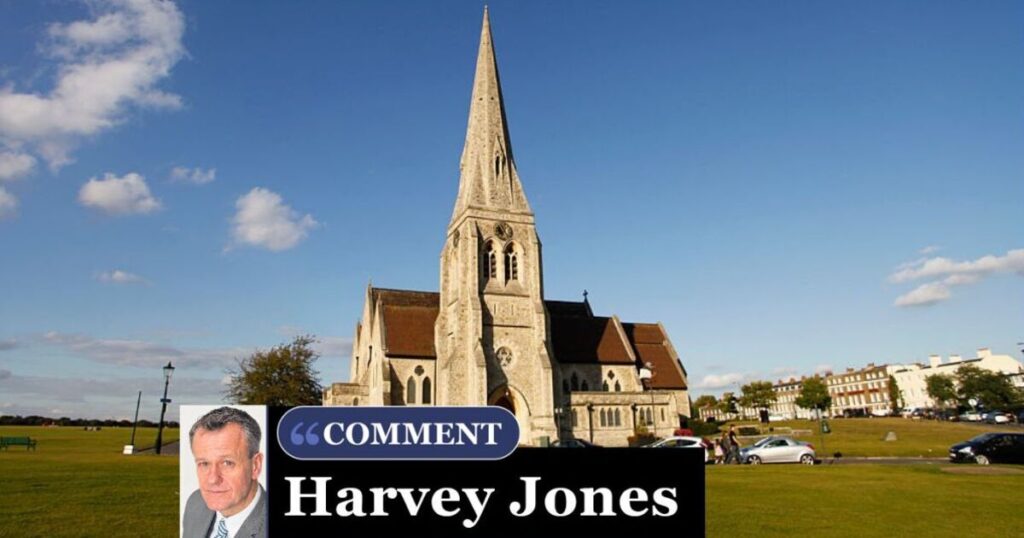
Blackheath Village, London’s first ever conservation area, is treasured for its green expanses, Georgian and Victorian houses, and bustling high street. Its Sunday farmers’ market, held in the station car park, has become the social hub of the neighbourhood.
Yet Lewisham’s Labour council plans to plonk a five-storey housing block right on top of it. The scheme, backed by developer Acorn Property Group, would see 45 “modern” homes built on the car park beside Blackheath Station.
The village is already short of parking but this would wipe out all but 17 of the station’s 162 spaces.
Locals also fear it will destroy the village’s character and overshadow historical streets and homes. They’ve labelled the plans « ugly, modern and generic ».
It’s been called the “Battle of Blackheath” and Sunday Express columnist Nick Ferrari has entered the fray. “This isn’t nimbyism,” he said. “People here have always supported appropriate development, but this is so far off the scale it’s as if it’s come from a different planet.”
Ferrari reminded the council that Blackheath has a long tradition of rebellion, stretching back to Wat Tyler’s Peasants’ Revolt in 1381. “It might be time to take to the barricades again,” he warned.
The battle is just one of many raging across the country, as the government launches a war against some of Britain’s most beautiful places. Blackheath has celebrity backing.
A string of famous names with deep ties to Blackheath have joined battle to block the plans, accusing the Labour council of wrecking one of London’s last intact villages.
Hollywood actor Jude Law, who grew up nearby, said the scheme would “enforce a strain on a wonderful old village that deserves our protection ».
Miranda star Sarah Hadland, who’s lived in Blackheath for two decades, told The Independent that she’s “horrified” by the hypocrisy of a Labour council that imposes strict planning rules on residents while letting developers “bend the rules to make money”.
Dire Straits legend Mark Knopfler, fashion designer Jeff Banks and humanitarian Sir Terry Waite have also urged Lewisham Council to back down.
Banks said: “To imagine Blackheath succumbing to mindless planning that would destroy one of London’s jewels does not bear thinking about.”
This isn’t just about Blackheath. Housing minister Matthew Pennycook will fast track the building of 40,000 homes on or around station car parks across the country.
Developers are being encouraged to push through dense new schemes on what officials call “untapped land”. In reality, that means more of Britain’s prettiest towns and villages could soon face the same fate.
A national backlash is growing. Furious residents in Porthcawl are fighting plans for 1,100 new homes they say will ruin their seaside town, while locals say this lovely little village cannot take the new homes being forced on it.
PM Keir Starmer has been accused of trashing the green belt and ruining historic villages by smothering them with new towns.
Energy Secretary Ed Miliband is also facing resistance as he litters our landscapes with wind turbines, solar farms, pylons and vast substations.
Labour has launched a war on beauty. Incredibly, former housing minister Angela Rayner went out of her way to scrap a rule that ensures all new housing is “beautiful”.
Yet this isn’t a party political issue. The battle for beauty unites Britons across the spectrum. Four years ago, a voter revolt forced former Tory PM Boris Johnsonto scrap plans to build on the green belt.
Labour insists it’s acting to fix Britain’s housing crisis. But in Blackheath, like so many other places, locals say this is about money, not homes. And that developers are using the crisis as cover to build what they like, where they like.
Blackheath’s residents aren’t having it. Their campaign has united neighbours, shopkeepers and celebrities in defence of one of London’s last true villages.
The Battle of Blackheath is about more than just one postcode. It’s a stand against a planning free-for-all that threatens to disfigure Britain’s beauty forever.
